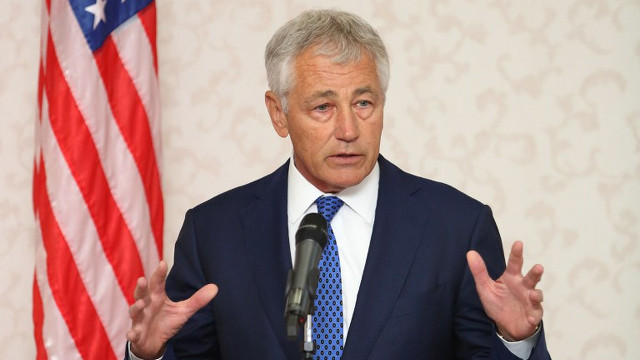SUMMARY
This is AI generated summarization, which may have errors. For context, always refer to the full article.

WASHINGTON, USA – Defense Secretary Chuck Hagel flies Saturday, September 28 to South Korea and Japan to affirm military ties that are entering a new chapter in the face of North Korea’s threats and China’s growing power.
It will be Hagel’s 3rd visit to the region as Pentagon chief, and comes as Washington presses ahead with its strategic shift to the Asia-Pacific region despite growing budget pressures and repeated crises in the Middle East.
The first leg of his trip in South Korea will be filled with symbolic moments as he attends celebrations of the 60th anniversary of the alliance between the two countries, a bond that dates back to the armistice that ended the Korean War in 1953.
Hagel on Monday, September 30, is scheduled to tour the demilitarized zone between the South and North with his counterpart, Kim Kwan-Jin and watch joint US-South Korean joint exercises. On Tuesday, he is due to attend a parade marking the country’s armed forces day and to hold talks with Kim.
On Wednesday, Hagel presides over a change of command ceremony for US forces in South Korea, with General James Thurman handing over to General Curtis “Mike” Scaparotti, who will take charge of the 28,500 US troops deployed in the country.
The alliance between Washington and Seoul calls for the American commander to lead South Korea’s 640,000-strong force in the case of a war with the North.
The two countries have repeatedly delayed plans to transfer “operational control” to Seoul, with an original goal of 2012 pushed back to 2015. Tensions with North Korea have made Seoul cautious about a scaling back of the US role, and the South has asked Washington to review the timing of the planned transition.
President Barack Obama indicated in May that the transfer would go ahead as scheduled, but US officials have not closed the door on the issue, amid concerns over the threat posed by the North’s nuclear and missile programs.
North Korea’s ‘cycle’ of provocations
“The North Korea provocations cycle is something that Secretary Hagel has handled early in his tenure,” said a senior defense official.
Days after Hagel arrived at the Pentagon, North Korea–responding to condemnation of its 3rd atomic bomb test in February–issued dire threats and warned of a “thermonuclear war” with the United States.
The question of when operational control should be passed to the South Koreans will feature prominently in Hagel’s talks with his counterpart and President Park Geun-Hye.
“I don’t expect any decisions on this issue but I think we’re going to have a discussion that’s going help to frame it up,” the defense official said.
In Japan, where tensions are running high with China, Hagel will take part Thursday along with US Secretary of State John Kerry in a “two plus two” meeting with their respective counterparts, Itsunori Onodera and Fumio Kishida.
The outlook for regional security will top the agenda for the discussions, including “what’s going on in the Korean peninsula, what’s going on elsewhere in Asia-Pacific, including China and the South China Sea,” said the defense official.
Tokyo is particularly concerned about what it considers China’s dangerous behavior around the Senkaku islands, an archipelago in the East China Sea that Beijing refers to as the Diaoyus islands.
During the talks, the two ministers also will look at the defense guidelines for the US-Japan alliance, which have not been amended since 1997, officials said.
The document outlines the conditions for deploying the roughly 50,000 American troops that are still stationed in Japan.
“At the core of the defense guidelines is a discussion about both the current and the future roles and mission capabilities of the US-Japan alliance,” the official said.
Hagel’s trip comes as Tokyo moves toward a dramatic shift in its security policy, with Japanese Prime Minister Shinzo Abe calling for beefing up his country’s military, citing the bitter row with China over the disputed islands.
The country’s defense minister, Onodera, said Thursday Japan should consider boosting its offensive power to bring more balance to its alliance with the US, as he said Tokyo has traditionally carried the shield and Washington wielded the weapon.
Hagel will wrap up his Asia trip on Friday with a stop at the US naval base at Yokosuka, where he will visit a destroyer and speak to troops. – Rappler.com
Add a comment
How does this make you feel?
There are no comments yet. Add your comment to start the conversation.